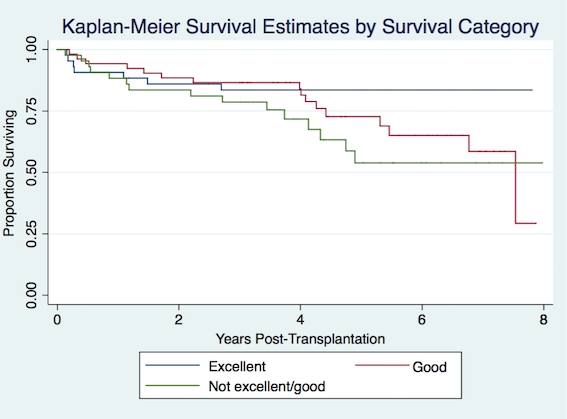The Utility of an Online Survival Calculator in Selecting Older Candidates for Kidney Transplantation
Vanderbilt University Medical Center, Nashville, TN.
Meeting: 2018 American Transplant Congress
Abstract number: A300
Keywords: Outcome, Prediction models, Waiting lists
Session Information
Session Name: Poster Session A: Non-Organ Specific: Disparities to Outcome and Access to Healthcare
Session Type: Poster Session
Date: Saturday, June 2, 2018
Session Time: 5:30pm-7:30pm
 Presentation Time: 5:30pm-7:30pm
Presentation Time: 5:30pm-7:30pm
Location: Hall 4EF
Background: Older patients referred for kidney transplantation are medically complex. A posttransplant survival prediction model is publicly available online and may aid physicians in selecting suitable candidates for transplant.
Methods: We retrospectively reviewed candidates >65 yrs at an academic center who received a kidney transplant from 2006-2014. Pretransplant characteristics (18 variables) were used to determine a survival prediction score (http://transplantmodels.com/candidate65), equal to the calculated probability of 3-yr posttransplant survival. Survival scores were categorized as excellent, good and not excellent/good according to published cutoffs. Posttransplant survival was determined by chart review. Kaplan Meier survival estimates were generated for each survival category. Multivariable Cox proportional hazards regression analysis was used to calculate the association between survival score and 3-yr posttransplant mortality.
Results: 156 patients with the following characteristics were included: 68 yrs, 56% male, dialysis vintage 29 mos, 42% DM, 33% CAD, mean survival score 81%. Based on risk categories, 32% were excellent, 27% good and 31% not excellent/good candidates. Median follow-up was 4.1 yrs. Overall, 39 (25%) patients died, 23 (15%) occurring within 3 yrs posttransplant. Mean time to death was 3.4 yrs. 3-yr and overall survival for excellent, good and not excellent/good candidates were 86%/86%, 88%/72% and 82%/67%, respectively. Kaplan Meier curves by survival category are shown (figure). Cox proportional hazards regression showed a significant association between survival score and 3-yr mortality (HR=0.95 [95% CI 0.91-0.99], p=0.015) and overall mortality (HR 0.94 [95% CI 0.90-0.97], p=0.001).
Conclusion: Although a survival score using pretransplant variables was associated with posttransplant mortality, 3-yr survival was reasonable even for patients categorized as "not excellent/good". The prediction model and online calculator may be helpful in identifying excellent older candidates for kidney transplantation but should not be used to exclude higher risk candidates who are otherwise deemed suitable by a clinical evaluation.
CITATION INFORMATION: Shwetar M., Abdel-Kader K., Concepcion B. The Utility of an Online Survival Calculator in Selecting Older Candidates for Kidney Transplantation Am J Transplant. 2017;17 (suppl 3).
To cite this abstract in AMA style:
Shwetar M, Abdel-Kader K, Concepcion B. The Utility of an Online Survival Calculator in Selecting Older Candidates for Kidney Transplantation [abstract]. https://atcmeetingabstracts.com/abstract/the-utility-of-an-online-survival-calculator-in-selecting-older-candidates-for-kidney-transplantation/. Accessed February 18, 2026.« Back to 2018 American Transplant Congress

